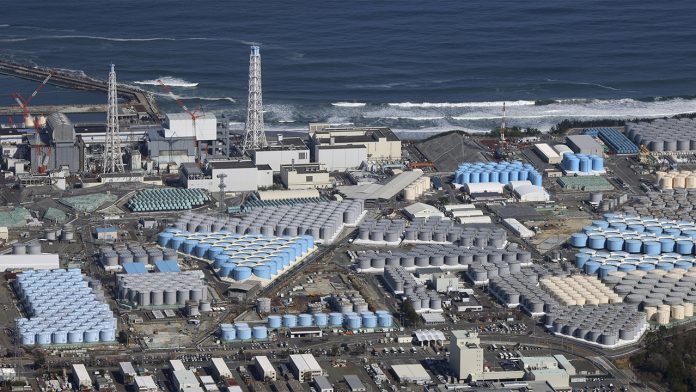China has condemned a Japanese plan to release treated radioactive wastewater from the damaged Fukushima nuclear plant into the sea, demanding that Tokyo first receive the approval of neighbouring countries.
China has made similar complaints on a regular basis in the past, but has not said how it would respond if Japan goes ahead with the planned release.
China, which Japan invaded in the first half of the last century, has been a constant critic of Tokyo and its security alliance with the US, with the ruling Communist Party frequently invoking historical wrongs to rally domestic support and seek to undermine Japan’s global standing.
Japan’s behaviour is “extremely irresponsible,” Chinese Foreign Ministry spokesperson Mao Ning said at a daily briefing.
“I would like to stress that Japan’s release of treated nuclear-contaminated water from the Fukushima plant concerns the global marine environment and public health, which is not a private matter for the Japanese side,” Mao said.
“Until full consultation and agreement is reached with neighbouring countries and other stakeholders and relevant international institutions, the Japanese side shall not initiate the discharge of nuclear-contaminated water into the sea without authorisation,” she said.
A magnitude 9.0 earthquake and massive tsunami slammed into the Fukushima Daiichi nuclear power plant 12 years ago on March 11, 2011, destroying its power and cooling systems and triggering the meltdowns of three reactors. Massive amounts of radiation were released in the surrounding area.
South Korea, several Pacific Island nations and Japanese fishing communities have also objected to the planned release.
Japanese officials and the plant’s operator, Tokyo Electric Power Company Holdings, say the radioactive elements in the water can be reduced to safe levels.
Agriculture, Forestry and Fisheries Minister Tetsuro Nomura has said he will work to counter any damage from the release to the reputation of the area’s seafood industry.
“We will convey the safety of the fish caught in the Japanese sea with scientific evidence,” Nomura said.
Meanwhile, Japanese offered tearful prayers Saturday on the anniversary of the deadly tsunami that triggered the Fukushima disaster, but public support for nuclear power is growing as memories of the 2011 meltdown fade.
A minute’s silence was observed nationwide at 2:46 pm (0546 GMT), the precise moment when a 9.0-magnitude quake – the fourth strongest in Earth’s recorded history – devastated northeastern Japan 12 years ago.
The undersea quake unleashed a tsunami that left around 18,500 people dead or missing and overwhelmed cooling systems at the Fukushima Daiichi plant, leading to the worst nuclear catastrophe since Chernobyl.
All of Japan’s nuclear reactors were taken offline after the disaster and the majority remain out of action today.
But the global energy crisis sparked by the war in Ukraine has caused electricity bills to soar in Japan, inspiring a government push to reboot reactors as polls show that public views on nuclear power are softening.
On Saturday, TV footage showed people who lost loved ones to the tsunami laying flowers, offering prayers and bowing in front of graves.
“Hi guys, it’s been 12 years,” public broadcaster NHK showed Fumiko Sugawara, 73, telling the grave of her family members, including her husband.
“We’re surviving, so please watch over us,” said the resident of Kesennuma, a city flattened when huge waves rushed ashore.
No deaths have been directly ascribed to the nuclear accident, after which around 165,000 people fled their homes in the area either voluntarily or under evacuation orders.
Most areas around the plant have since been declared safe after extensive decontamination work, but many former residents have chosen not to return.
With Japan now facing its most severe energy crunch in decades, the government wants to speed up the revival of its nuclear industry.
Prime Minister Fumio Kishida has called for seven reactors approved by Japan’s nuclear safety watchdog to resume operations, and for the nation to consider building “next-generation” reactors with new safety mechanisms.
Recent opinion polls by major newspapers the Asahi Shimbun and Yomiuri Shimbun show that a majority of people support restarting the reactors for the first time since 2011.
“The government will continue to spearhead efforts toward the safe and steadfast decommissioning of the Fukushima Daiichi plant – a process crucial to recovery,” Kishida said at the Fukushima memorial service.
“It is our responsibility to promote efforts to build a disaster-resistant country.”
Mistrust of nuclear power still runs deep among campaigners who accuse TEPCO, the operator of the Fukushima plant, of safety lapses that upended local communities.
In January, Tokyo’s High Court upheld the acquittal of three former TEPCO executives, again clearing them of professional negligence over the disaster.
But in a separate civil verdict last year, the trio – plus one other ex-official – were ordered to pay a whopping 13.3 trillion yen (US$97 billion) for failing to prevent the accident.
The enormous compensation sum is believed to be the largest ever for a Japanese civil case, although lawyers acknowledge it is well beyond the defendants’ capacity to pay.
The government also plans to start releasing more than a million tonnes of treated water from the stricken Fukushima plant into the sea this year.
A combination of groundwater, rainwater that seeps into the area, and water used for cooling, it has been filtered to remove various radionuclides and kept in storage tanks on site, but space is running out.
The water release plan has been endorsed by the International Atomic Energy Agency but faces staunch resistance from local fishing communities and neighbouring countries.
SOURCE: AP/AFP/PACNEWS














